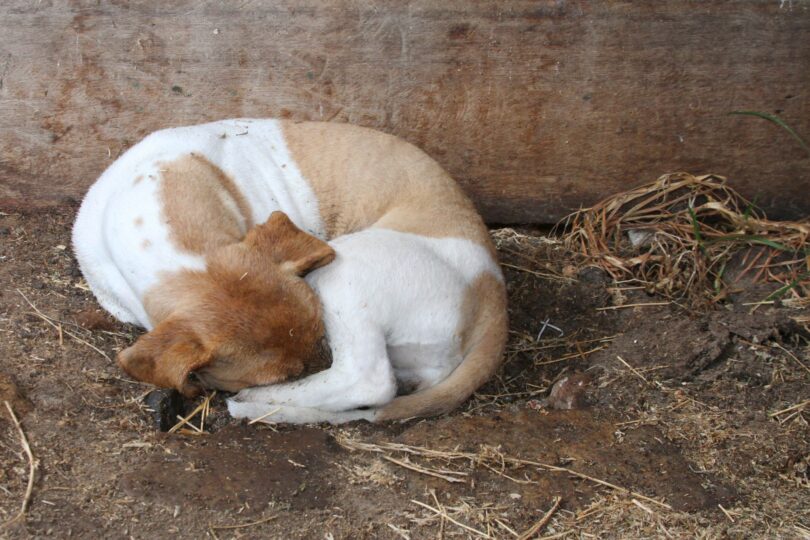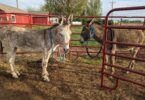Note: This article was originally published on our sister site Love & Let Go.
How to Help Your Grieving Farm Dog
Few situations are more stressful than seeing your animal in distress—be it your horse, dog, or kitty. Not only do barn dogs experience a wide range of powerful emotions, they can also form emotional bonds with both humans and other animals.
As a result, dogs are also capable of grieving the loss of such relationships. Owners often wonder if dogs are also capable of grief. Canine behavior leads us to believe the answer is yes… but are we only projecting?
While they may not mourn in the same way as humans, dogs are emotional beings. By learning to read his body language and behaviors, you can understand more about what your dog is feeling and how you can help ease distress. Each dog and situation are different, but there are many things that you can do to help pets through the grieving process.
Dogs and emotions
Although the topic of animal emotions has long been disputed, today’s science has proven what pet-owners have known instinctively all along. Animal behavior expert Marc Bekoff explains:
“There are ample detailed data from many ethological perspectives and a growing number of neuroimaging studies that clearly show that dogs are emotional beings who experience joy, happiness, sadness, grief, pain, disgust, jealously, and likely guilt.”
Is your dog grieving?
Be on the lookout for behavioral cues in your dog that can help alert you that he’s in distress—for example, changes in sleeping or eating patterns, changes in interactions with others, and troubling body language.
Here are common behavioral changes to watch for:
- Your dog has recently stopped eating, or is eating less (or more) than he used to.
- Your dog is sleeping much more than usual, he has relocated to a new place on the farm when he sleeps, or he seems to have trouble settling down to sleep at all.
- Your dog acts sluggish throughout the day.
- Your dog just “doesn’t seem like himself” lately.
- Your dog starts being more disobedient—he’s acting up more, chewing things he shouldn’t, going into areas where he knows he’s not allowed, etc.
- Your dog’s typical behavior has noticeably changed—he’s not interested in his favorite activities or is being oddly clingy.
- Your dog seems to more vocal lately—crying, whining, whimpering, etc.
- Your dog appears more nervous or anxious—for example, reacting to noises that never used to bother him.
- You notice personality shifts in your dog.
Of course, much like humans, each farm dog has his own individual personality and will react differently to grief.
It is always important to take your dog to the vet to rule out any physical ailments that may be the cause of its distress.
If no physical causes are detected, it’s likely that he is experiencing some level of depression. As would your friends or family, your dog deserves your understanding and support.
How to deal with dog grief
How can you help a dog who is grieving? Remember that each dog and each situation will vary. Pay close attention to your dog so that you can discern what he needs.
Some dogs may simply need time to mourn their loss, while others may crave more attention from you during the process.
Here are a few strategies that may help your dog:
- If your dog has lost a companion (human or animal), he may not understand where his friend has gone. This can leave him feeling confused and unsettled. Try to stick to your dog’s routine as much as possible to provide him comfort and stability.
- Grief counselor Lisa Havelin suggests, if possible, allow your dog “to have a moment to visit with their friend’s body—they have their own way of sensing what has happened to their friend.”
- Give your dog an object that belonged to his companion—a blanket, a shirt, a toy—the familiar scent can provide comfort now that his companion is gone.
- Help your dog physically care for himself. Make sure he is eating, drinking, and getting exercise. He may be too distracted to focus on these tasks for a while.
- Include your dog in your own daily activities—this will help keep him engaged and feel a sense of connection.
- Increase exercise and playtime with your dog. Mental stimulation (such as puzzle feeders), physical stimulation (such as trail rides), and relational connectivity (such as taking him with you to the feed store) are great ideas.
- Your dog might benefit from a new companion—eventually. Be especially careful and sensitive, though, as adding a new relationship could create more problems than it solves. Be sure that you and your dog are both ready for another companion. Let your dog meet any possible new dogs, cats, or other companions before fully committing to bringing one home to stay. Your dog needs to get along with the new pet so that his grief doesn’t turn into resentment.
Frequently Asked Questions
Q: Do dogs know when another dog has died?
We still don’t really know whether dogs fully comprehend death, but they do feel loss and can experience grief. Canine psychology expert Dr. Stanley Coren explains that a dog recognizes when another has gone, but he may not understand why his canine companion isn’t coming back.
Dr. Coren’s own dogs, Dancer and Odin, grew up together and when Odin died, Dancer keenly felt his loss:
“His anguish only gradually wound down, and it was several weeks before he stopped checking all of the places that Odin should have been whenever he came home from a walk. Much like one might expect from a child who did not have the concept of the permanence of death, Dancer never gave up on the idea that Odin might reappear. Up through the last year of his long life, Dancer would still rush toward any long-haired black dog that he saw, with his tail batting and hopeful barks as if he expected that perhaps his friend had returned.”
Q: How long does a dog grieve for another dog?
The grieving process will be different for each dog and situation. Some dogs may never forget the loss of their canine companion (just as Dancer still hopefully searched for Odin).
For others, it may be a matter of weeks, months, or even years. As with humans, each dog’s experience with grief is individual and personal.
Q: Do dogs mourn their owners?
Just as dogs can form emotional attachments and bonds with their owners, they can experience deep sorrow and grief from the loss of human companions. Some dogs may slip into a period of depression, while others become agitated and unruly.
That said, there is also something unique about how dogs may experience the loss of their owners. According to Dr. Coren, dogs seem to maintain a sense of hope:
“Yes there is sorrow, but perhaps something more positive than grief. Because dogs do not have the knowledge that death is forever, at least there is the option to hope – a hope that their loved one might come back again.”
Let this be a beautiful lesson for us all.
Not If, But How
Rather than questioning whether or not our dogs have emotions—since science has proven that they clearly do—we instead need to focus our energies on how we can best help our pets when they experience loss.
Since each dog will respond to grief in his own individual way, watch for signs that he is grieving. Then, actively provide him with the emotional and physical support that provides him the greatest comfort.
P.S. If you found this article helpful, check out:
- Canine Empathy: Can Barn Dogs Sense Sadness?
- Barn Dog Pain Solutions 101 (Home Remedies, Holistic, etc.)
- Dogs in Distress: Do Barn Dogs Grieve?
- 5 Signs It May Be Time to Bid Your Farm Dog Farewell
- My barn dog isn’t eating. Should I be worried?
- Preparing for Peace: What it Means to Euthanize a Barn Dog
- Fox Hunting Fidos: Beagle Life Stages and Average Lifespan







